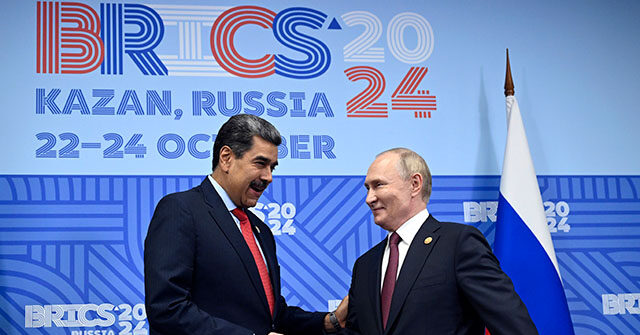On Tuesday, Nicolás Maduro, the socialist dictator of Venezuela, arrived in Kazan, Russia, to participate in the 16th annual summit of the BRICS nations, an alliance largely seen as a counterweight to U.S. influence. His arrival coincided with reports from Brazilian media suggesting that Venezuela would likely not be granted an invitation to join BRICS, a claim allegedly influenced by Brazil’s President Luiz Inácio Lula da Silva. During the summit, BRICS member states announced a new list of 13 countries that would be accepted as “Partner States,” a designation that excludes Venezuela. Despite this setback, Maduro stated his intention to share Venezuela’s narrative of anti-colonialism and independence at the summit, which he characterized as a platform for nations seeking sovereignty and prosperity beyond Western hegemony.
Maduro expressed at the summit his readiness for Venezuela to participate in what he described as a “multicentric and pluripolar world,” emphasizing the importance of access to a cooperative global economy that eschews sanctions and dominance by a single power. Throughout the past decade, Maduro has more than once attempted to gain full membership in BRICS, which he has pitched as a chance to leverage Venezuela’s vast oil and natural resources for broader economic collaboration among emerging nations. During a previous gathering in Johannesburg, he had emphasized the strategic significance of Venezuela’s oil in bolstering the bloc’s collective resources.
The Venezuelan leader’s meeting with Russian President Vladimir Putin marked a key moment of bilateral engagement. The two leaders discussed their countries’ cooperative dynamics within the BRICS framework, underscoring the long-standing ties of friendship and support they have forged. Interestingly, Maduro had originally intended to meet Putin the previous December, but this meeting had been postponed multiple times, reflecting complex geopolitical interactions. Maduro expressed admiration for Putin’s stance against what he labeled as Nazism and fascism, a reference to Russia’s military actions in Ukraine. His comments indicated a shared ideological alignment with Russia’s assertive geopolitical posture.
Despite Maduro’s optimism about his country’s alignment with BRICS principles, reports emerged indicating that Brazil’s leadership was actively opposing Venezuela’s inclusion in the bloc. Lula’s administration seemed to favor a consensus rule, whereby decisions on new membership would necessitate agreement among existing members. This dynamic posed a significant barrier to Maduro’s aspirations, especially given Lula’s apparent discontent with Maduro’s regime after the contentious July elections in Venezuela, which many international observers have called fraudulent. Brazilian diplomats suggested that while there might not be an outright veto against Venezuela joining, the consensus requirement was being manipulated to exclude it.
In pursuit of bolstering alliances, Maduro took the opportunity during the summit to hold discussions with key leaders who are sympathetic to his cause. His engagements included talks with Turkish President Recep Tayyip Erdogan, Belarusian President Alexander Lukashenko, and Palestinian Authority leader Mahmoud Abbas. These meetings reflect Maduro’s efforts to consolidate support among nations that share anti-Western sentiments and might align with his views on global power dynamics. His strategic focus on these relationships highlights his desire to reinforce Venezuela’s geopolitical standing despite setbacks at the BRICS summit.
In summary, Maduro’s participation in the BRICS summit served to underscore his ambitions for integrating Venezuela into a broader coalition of emerging powers that reject U.S. hegemony. However, the exclusion of Venezuela from the new Partner States list, influenced notably by Brazil’s internal politics, has clearly complicated these aspirations. As the summit unfolded, Maduro’s rhetoric emphasized a narrative of resistance and cooperation, but the reality of his regime’s international standing reflects significant challenges in garnering the acceptance and support he seeks from a shifting geopolitical landscape.

